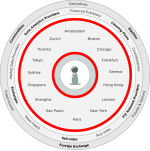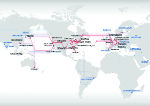Equinix and Fixnetix: Beyond collocation – Robin Manicom and Al Moore
As an algorithmic trader, access to a multitude of financial market participants and proximity to key trading venues bring multiple benefits, from reduced costs to rapid responsiveness. Al Moore of Fixnetix and Robin Manicom of Equinix explain how a close partnership with your data centre provider can provide a solid platform for growth and keep institutions at the top end of the latency curve.
Technological developments over the past few years have seen finance professionals become increasingly mobile. The growth of tablets and smartphones, combined with the cloud operational environment, has allowed information to be exchanged on the move and over great distances. Proximity is still an important factor, however, particularly when it comes to algorithmic trading.
Thanks to ever more sophisticated electronic trading technology, latency levels are being driven down to the point where a few microseconds can make millions of pounds' worth of difference over the course of a year.
When speed is of the essence, the distance between data centre and user is crucial - a fact that is complicated by the need to provide services across multiple geographies and asset classes. This is where UK technology provider Fixnetix made its name.
Achieving algorithmic efficiency
Founded in 2006, Fixnetix specialises in providing outsourced services for ultra-low-latency trading, market data and infrastructure connectivity.
The company, which recently announced the launch of its new iX-eCute field-programmable gate array (FPGA) technology to facilitate nanosecond trading, analyses every link in the technology chain and applies best practice to facilitate lower-latency trading and reduced costs.
"Latency is all about efficiency, which is ranked according to where you sit on the curve," explains Al Moore, the company's business development manager and founding member.
"You could spend X amount of money and be placed in the top ten percentile of performance. But the market has become so efficient that, by making no changes, you become less efficient over time and can drop out of that targeted range.
"It is a great idea for companies in the algorithmic trading space to outsource some of their core infrastructure to an organisation that is focused specifically on these competencies, which are often difficult to carry out within an organisation."
In 2008, Fixnetix decided to aggressively expand into a number of major financial centres and emerging market exchanges. To do this, it needed an infrastructure partner that could help effectively deliver low-latency technology direct to its customer base. The company approached data centre provider Equinix.
A broad data network
With nearly 100 International Business Exchange (IBX) data centres operating in 38 markets across the globe, Platform Equinix - as its proprietary solution is called - could provide the required degree of proximity to Fixnetix's target markets and customer base.
"Equinix has shown itself to be very agile in terms of its relationships with some our core customers and the main exchanges to which we provide solutions, and also in the way they run their data centres," Moore says. "Where data centres are shared, we normally choose the Equinix area because we know exactly what we're going to get."
As well as having data centres in proximity to many important markets, the company, by nature of its collocation model, offers a broad network of market participants and service providers.
With more than 380 buy and sell-side firms, over 150 service providers and around 700 networks on its platform, Equinix can provide its customers with multiple opportunities for revenue generation.
Give and take
"The benefits of moving into a data centre, in terms of both performance and connectivity, only work if the data centre has the right participants," explains Robin Manicom, EMEA director of financial services at Equinix. "We've tried to stay ahead of the market in this respect. After focusing on cash equities companies, we turned to the foreign exchange (FX) markets, then derivatives, followed by fixed-income markets, and now span across multiple asset classes.
"Customers can evolve their businesses based on the fact that there is the right target base for them inside the data centre, while we make sure they are informed of where there are trends or pockets of opportunity."
Being in close proximity to a broad range of trading venues and financial services companies in turn allows companies such as Fixnetix to reduce the costs associated with physical connectivity. The company has deployed more than 370 cross-connects on Platform Equinix, which, enabled by the Smart Hands IT services team, can be made quickly and with minimal overheads. In addition, the standardised look and feel of the platform means that networks can be expanded with relative ease based on a common set of terms and conditions.
"We can connect new customers to Fixnetix within a 24-hour period, which gives the company a large market to play with," explains Manicom. "Because a multitude of trading participants are located in the same data centre, physical connectivity is no longer a cost issue and responsiveness has improved. This effectively moves the focus onto the services that Fixnetix can provide, rather than having to ask whether they are in the right location. We don't compete with our customers. Our business relationship is symbiotic."
Sustainable data
Looking ahead, both Manicom and Moore see sustainability becoming a dominant issue. The development of FPGA, which Fixnetix has pioneered, will have a significant impact on the financial services industry.
These microchips can be configured by the user following manufacture, and used to imbed exchange gateways and trading algorithms in the same hardware. This will greatly reduce the physical and environmental footprint of the data centre, bringing latency to an even lower level. With demand for data space growing all the time, this could, in Moore's view, push more companies towards co-located centres.
"I think the adoption of FPGA technology will have an impact upon power consumption and the data centres' eco-footprint, while also enabling market-neutral data centres to provide a market that is fair to all participants through the reduced distance and increased density of trading processes to any core exchange matching engine," says Moore.
"Some people have questioned the validity of collocation data centres, but when they see where technology is going and how it's going to empower people in terms of processing power and message throughput, they are going to adopt it fairly quickly."
Promising mutual growth
Fundamentally, the biggest challenge for Equinix will be ensuring that supply of server space always keeps pace with demand. Manicom is fairly confident about this and believes that forming strong relationships - such as that between Equinix and Fixnetix - can drive mutual growth. Fixnetix's revenues have grown a phenomenal 24,557% since 2007 and, with the right partners, will likely continue in a similar vein.
"When a customer picks a data centre vendor, generally speaking they have future plans that, if their business is successful, they will expand with that company," he explains.
"Our pledge is that we won't go dark on you - we won't run out of server space for our customers to expand into. Both our organisations have grown together in the financial vertical and our partnership has helped us attract customers to a common ecosystem. We can ensure Fixnetix's success by not causing the company any problems downstream and it, in return, benefits from a rich playing field on which to do business."




